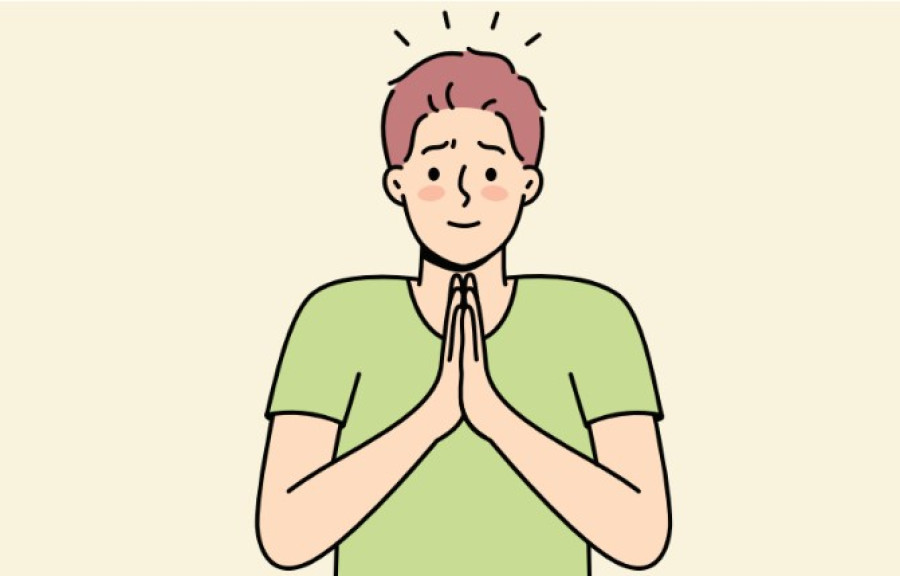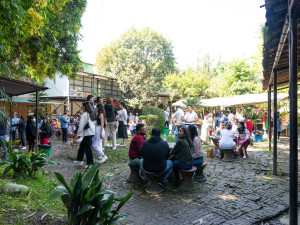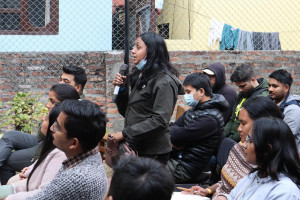 16.12°C Kathmandu
16.12°C KathmanduCulture & Lifestyle
Are we being nice or people-pleasers?
Psychologist Srijana Mukhiya sheds light on the causes, effects and coping techniques related to people-pleasing tendencies.
Aarati Ray
People-pleasing is a habit where individuals consistently prioritise others’ needs over their own. Those with these tendencies often go to great lengths to seek approval, avoid conflicts and gain validation from others.
Srijana Mukhiya, a psychologist at Healthy Minds who holds 15 years of experience in therapy, sheds light on the causes, effects and coping techniques related to people-pleasing tendencies.
How do people-pleasing tendencies impact mental health?
Imagine the pressure one has when they are always saying yes. When you keep saying yes all the time, you end up taking on more than you can handle. This makes you super stressed and overwhelmed and leads to feelings like anxiety, anger and resentment. You might get angry and resentful because you're always trying to be nice, but it feels like everyone takes advantage of you.
Often, always attempting to please others can make you tired and sad and even lead to depression and anxiety. I’ve seen many people in my therapy who feel exhausted and sad because they find it hard to say no, and it can contribute to their struggles with depression and anxiety.
While it does affect mental well-being, I wouldn’t call people pleasing a mental health disorder. It’s more of a personality trait that often develops from challenging experiences in childhood, like feeling neglected or rejected. It originates from emotional rejection and feeling unworthy. When you face constant emotional letdowns as a kid, it can make you feel unsure about yourself. Seeking approval from others through people-pleasing is not a disorder, but it does have an impact on how you feel mentally.
What are the common signs of people-pleasing tendencies and behaviour?
The big sign is finding it hard to say no. Saying yes even when your schedule and plate are beyond full is the most defining sign of people-pleasing tendencies. Another problem is not expressing your feelings when you’re upset. Always saying sorry first is another sign because you don’t want conflicts. You worry that if there’s a problem, people will get mad at you.
Also, not having your own opinion is another hint. For example, in a group, if someone suggests eating momo and you don’t like it but have people-pleasing habits, you end up saying yes and later regretting it. Valuing your needs and wants less than others is also another indicator. You’re always ready to help and support others but forget to do the same for yourself.
Are people-pleasing tendencies more prevalent in youths or any specific age group?
No, not necessarily. You can see it in people of all ages. I noticed these signs in a 10-year-old recently. It usually begins when you’re very young and becomes more noticeable as you age. You might start showing these signs at school or work when there’s more work and a busy schedule. Because of all this, people might become passive-aggressive. So, it’s common in everyone, whether you’re young or old.
Does trauma lead to people-pleasing tendencies?
If someone had a tough time and trauma in their childhood, they might end up being a people-pleaser. For instance, if a kid grew up in a home with fighting and violence, they probably spent a lot of time being careful not to upset anyone.
They get scared of conflicts and always try to stay out of the way and be invisible. I have seen individuals who come from homes with a lot of fighting, domestic violence and dysfunctional families develop these habits.
In our society, signs of people-pleasing get mixed up with the idea of an obedient and good child. How can family members recognise if what they observe in a person aligns with people-pleasing tendencies rather than just being nice?
Understanding the difference between being genuinely nice and always trying to please others is essential. People with a strong sense of self know when to say no because they realise their limits. But those with people-pleasing habits struggle with setting boundaries and end up saying yes to everything. This often comes from needing more validation and appreciation for their past.
So, watch out for signs like low self-esteem, saying sorry too much, constantly seeking approval, having a low opinion of themselves, finding it hard to say no, or pretending to be someone else to make others happy. If someone neglects their well-being and boundaries to say yes and please others, it goes beyond being nice and can harm themselves.
As a parent or teacher, it’s essential not to use guilt, shame or punishment to make kids realise their mistakes. In our culture, there’s often a habit of making children feel ashamed or guilty to point out their errors. Try not to be too critical of your child all the time because that can make them doubt themselves, and then they might seek approval and try to please others. It becomes a cycle.
We should also change the idea that everything elders say is always right and can’t be questioned. Grown-ups can make mistakes, too. So, don’t scold kids just because they have a different opinion. Don’t ignore their feelings; try to understand and validate their thoughts. If parents, relatives, teachers and caregivers start paying attention to these things, many people might not develop people-pleasing habits because these habits often begin in childhood and due to family circumstances.
What self-help techniques can individuals use when they recognise they have people-pleasing tendencies?
Firstly, it’s essential to discover your value because it all begins with feeling not good enough and having low self-esteem. Try understanding who you are, not just what society or others say or make about you. Pleasing others often starts by always seeking approval and avoiding disappointments. So, it’s crucial to know that making mistakes and facing letdowns is a normal part of life. Start sinking in that it's okay to feel uncomfortable and say no sometimes.
Another important thing is setting boundaries—it helps you protect yourself and communicate clearly. Starting with small steps, like giving your opinion even if it’s different, helps. Remember, saying no doesn’t make you a wrong person, even if people with people-pleasing habits often worry it does.
Do you think social media has influenced or affected individuals’ people-pleasing tendencies?
Certainly! Think about how we post things on social media and get happy upon seeing likes and comments. What’s happening there? We are seeking approval and validation from others, wanting the whole world to like what we post. Now, picture how it affects young ones with signs of people-pleasing tendencies. When they share something and see negative comments, it can make them anxious.
I believe social media has become a place for instant gratification and satisfaction, but for people who want to please others, it can make their anxiety even worse. Even those without people-pleasing habits expect likes and comments on social media, so imagine how much more it means to those with people-pleasing tendencies.
When they don’t get the response and validation they hope for, it can make them feel sad and depressed, affecting their mental health. Social media can make things even more challenging for people who are already people pleasers.
How can we curb the disadvantages of social media for people with people-pleasing tendencies?
Firstly, kids and young ones need to grasp what social media is all about. While it’s a great way to express themselves, it has many downsides. Many teenagers today get so caught up in it that they forget who they indeed are.
When I worked with high school children in America, I always tried to explain to them what social media is, what they are doing on it, and how to use it healthily. I talked about the difference between healthy and unhealthy social media use. Social media is a tricky world; even adults find it hard to figure out, so it’s even more complicated for young ones.







.jpg&w=200&height=120)












